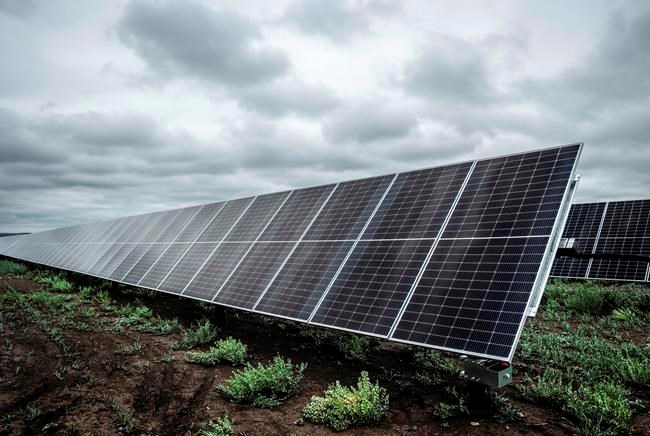EDMONTON — New information requirements for Alberta power generators including wind and solar projects will create further problems for a booming renewables industry that government policy has already slowed, said an industry advocate.
"They introduced more questions than answers," said Jorden Dye of the Business Renewables Centre, a group that links generators and purchasers of renewable power.
On Wednesday, the Alberta Utilities Commission released a series of interim information requests that those proposing new projects will be required to answer. The requests apply to all proposals, including renewable projects already under a six-month approval moratorium imposed by the United Conservative Party government.
The pause is supported by some landowners as well as municipal districts and counties but has also been criticized by municipalities, energy economists and business leaders.
During the six months, the commission is to hold an inquiry into how to regulate Alberta's renewables industry — the largest in the country and responsible for billions of dollars in investment, millions of dollars in taxes and thousands of jobs. While the inquiry is underway, power proposals must answer the commission's interim requirements.
Dye said the commission's questions around land use, agricultural impacts and reclamation are reasonable. Some are already part of the approval process; others the industry is willing to answer.
Others seem arbitrary, he said.
Proponents must "list and describe pristine viewscapes … on which the project will be imposed," the commission says. "Describe mitigation measures available to minimize impacts from the project on these viewscapes."
That's not very clear, said Dye.
"It's too vague to be actionable. How can you submit information on your impact on pristine viewscapes if pristine viewscapes are not defined in any way?"
Other questions infringe on decisions by individual landowners, Dye said.
"These are deals between private landowners. That farmer knows the best use of that land — they're aware of the effects (of power generation)."
Dye said other industrial and energy developments are not subject to similar requirements.
"I do feel the renewables industry has been singled out."
Commission spokesman Richard Goldberger said in an email that many of the new requests simply restate questions that applicants would have had to answer anyway.
"The interim information requirements bring this information-gathering exercise to the front-end of the proceeding," he wrote.
Goldberger wrote formalizing the information requests will ensure all applicants are treated the same.
"Gathering uniform information from active applications will help proceeding panels understand the potential impacts of individual applications and will also inform consideration of these issues in the inquiry."
Opposition New Democrat energy critic Kathleen Ganley said the interim information requests have muddied already murky waters.
"Interim rules don't create certainty," she said.
She pointed to letters received by the commission from renewable energy companies warning Alberta's investment reputation is at risk.
One company, Renewable Energy Systems, said “the moratorium will result in severe uncertainty among investors, jeopardizing billions of dollars of investment in Alberta.”
Aira, a subsidiary of a large multinational infrastructure company, said the pause endangers its plan for a billion-dollar solar farm.
“The regulatory delay places undue burden on the project economics, placing investment and jobs in jeopardy … further delay and uncertainty related to the pause could jeopardize the project and all of the benefits it will bring to Alberta.”
Ganley said the pause, which was announced without consultation with industry, affects Alberta's overall reputation as a place to do business.
"(The United Conservatives) have changed the rules suddenly and without warning, putting at risk a whole bunch of people's investments and capital. That's going to have long-term effects."
This report by The Canadian Press was first published Sept. 7, 2023.
Bob Weber, The Canadian Press




